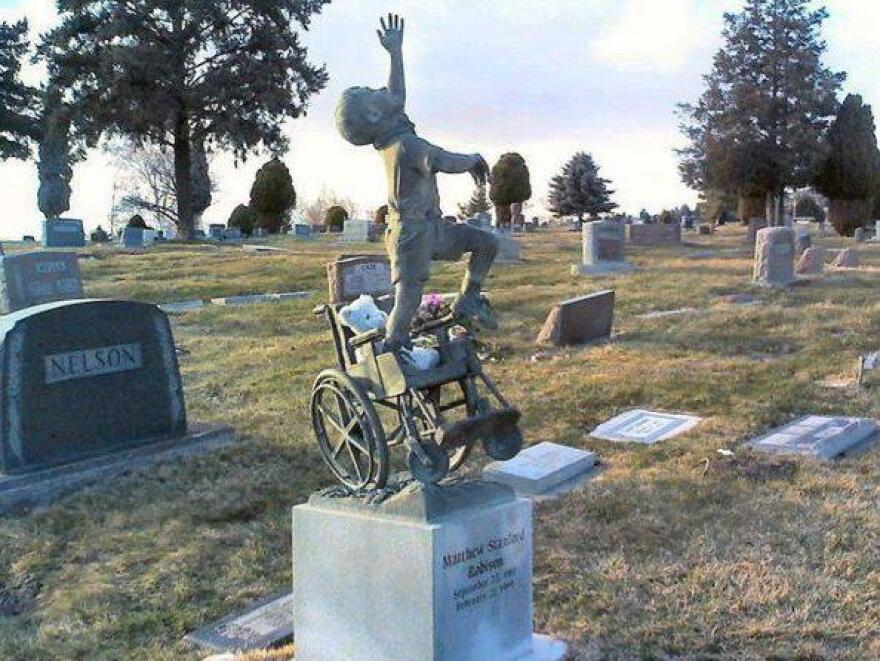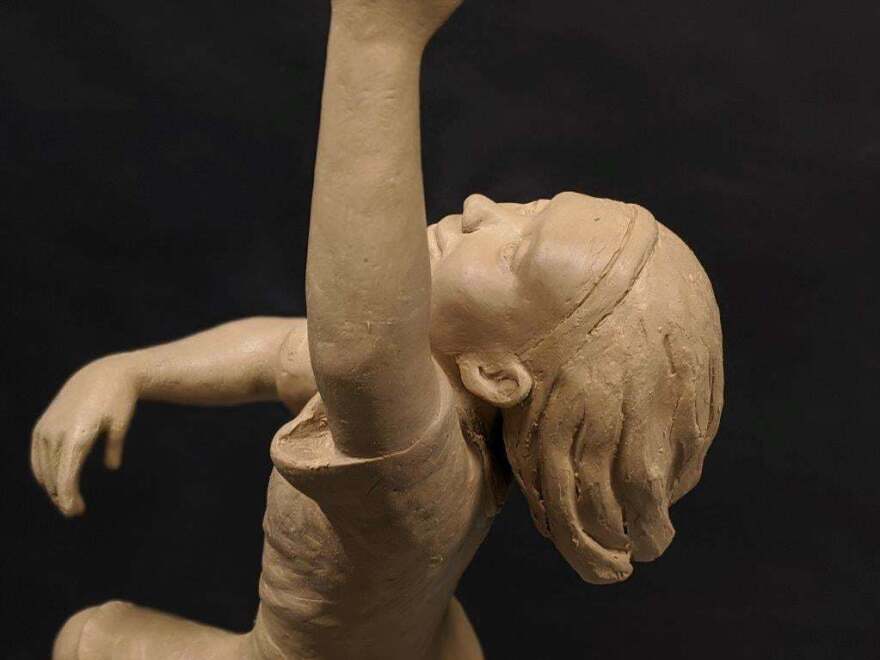Matthew Robison, who had cerebral palsy, spent his entire life in a wheelchair. So when he died at age 10 1/2, his parents thought they'd commemorate his life with a unique grave monument showing that he'd been liberated from the device.
"I got the idea that he would just be able to rise physically from his wheelchair and go up to heaven," his father, Ernest Robison, told NPR.
"And he'd be free from all of the disabilities and limitations that he had here on the Earth," Matthew's mother, Anneke Robison, added in the same phone interview.
The result of Ernest Robison's vision is a moving, giant bronze sculptural headstone at Matthew's gravesite at the Salt Lake City Cemetery. The sculpture depicts the boy standing with one foot on the seat of a dilapidated wheelchair. His face is lifted and his left arm is reaching up toward the sky — movements his mother says he was incapable of making while he was alive.
Meanwhile, his right arm is "folded with his hand hanging down like he was disabled," his father explained. The whole work of art rests on a square block with Matthew's brief epitaph: Sept. 23, 1988 - Feb. 29, 1999.
It looks nothing like a conventional grave marker, and the Robisons say that for them, that's what makes it a joy to go to the cemetery — "because it gives us hope and peace," Anneke Robison added.
The sculpture has also become popular on social networks online and among cemetery visitors — many place stuffed animals and other toys on the headstone. According to the Robisons, there is a new wave of interest in the sculpture every few years.
"I can't really explain what makes it come back up on the internet or why it suddenly becomes popular again," Matthew's father said. "But it makes sense to me. ... It touches people in a special way."

Ordinances typically restrict gravestone designs
Most recently, photos of the monument have been circulating on Reddit, drawing thousands of comments from users, who call it inspiring and beautiful. They also wonder why there aren't more customized headstones in other cemeteries.
Keith Van Otten, the Salt Lake City sexton, the person responsible for maintenance of cemetery grounds, says there's an easy explanation.
Most cemeteries are subject to city ordinances that restrict the size of monuments, Van Otten told NPR. The ordinances typically set size standards, which are established to ensure proper maintenance and future burials in the area, he added.
In cases where families hope to use a headstone that's out of the ordinary, Van Otten noted that at the Salt Lake City Cemetery, "there is a variance process, and the public can go through that if they want an oversized [grave marker], and that goes through our office and then through the mayor's office."
The cemetery has become something of a sightseeing destination for locals and tourists. A local group, Friends of the Salt Lake City Cemetery, leads organized tours, and Van Otten says brochures for self-guided tours are available.
He said Matthew Robison's grave was part of a tour recently led by a state historian, who talked about the different types of headstones and sculptures that can be found among the cemetery's 125,000 graves.
Van Otten said it is popular with visitors, "especially kids, because they see this little boy, kind of floating out of his wheelchair, and he looks happy."
"I think it speaks to them," Van Otten said.

Matthew's life inspires a charity
The Robisons, who are very religious people, are pleased that after a life of so much physical suffering, Matthew's headstone serves to bring joy to people.
"Really, I just did it for my own comfort," Ernest Robison said, adding that he found some solace in the process.
Although he is an artist, his preferred medium is oil paints. He'd never made a sculpture before this one. That's why he enlisted the help of his cousin, who is a sculptor. Together, they worked for months to create a mold for the statue, which was then cast in bronze. It was expensive and time-consuming, but in the end, he says, it was worth the effort.
When he eventually took the mold to be cast, he said, "everybody in the company — about 30 people — stood around and looked at it. And they just kept looking at it and kept looking at it," he recalled.
"And then I realized that this was something that people all around the world really relate to. I never thought that would happen before."
Since then, Robison and his wife started a charity organization called Ability Found that matches people with free or discounted new and used wheelchairs and other medical mobility equipment.
Much of the money they raise comes from donations, but they also sell miniature versions of Matthew's headstone, as well as a version depicting a little girl rising out of a wheelchair.
"I realize that death and disability is a worldwide concern, and it's still good for people to see hope that they can rise to heaven and be healed and live a better life," Ernest Robison said.
Copyright 2022 NPR. To see more, visit https://www.npr.org.




